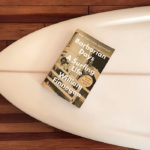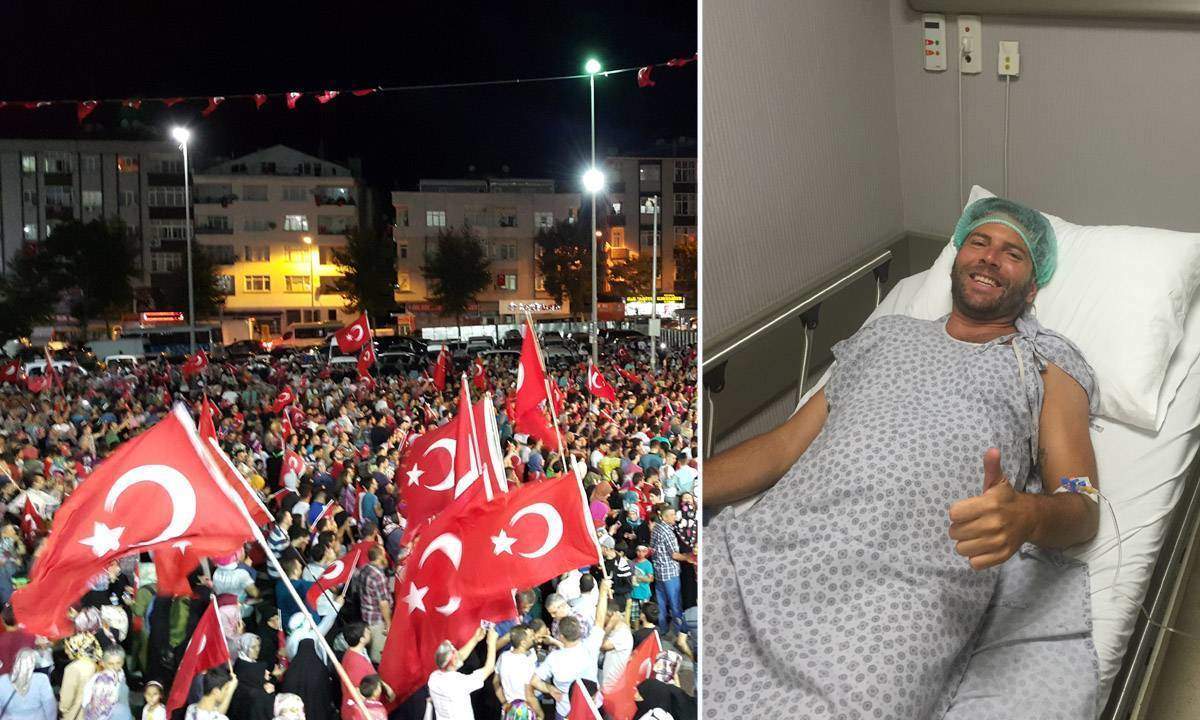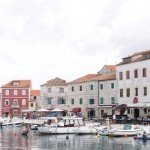There’s getting sick while traveling overseas, a patently awful experience. Then there’s getting appendicitis while traveling overseas. And then there’s getting appendicitis while traveling overseas during a military coup. This is that story.
Aaron Spencer, a United Nations Development Programme contractor based in New York City, headed to Turkey last July to assess initiatives there and to look at the response to the refugee crisis in the region on the local level.
Two days before his scheduled flight from New York City to Istanbul, a group within the Turkish military attempted a coup d’état, with most of the related activity taking place in Istanbul and the Turkish capital of Ankara. While the attempt was largely thwarted by the end of the weekend, the country remained entangled in what the New York Times called “a witch-hunt environment” for weeks after, as President Erdogan continued to direct the arrests of soldiers, government workers, and journalists on a widespread scale. The country was under an official state of emergency when Aaron got there. And then his stomach started to hurt.
More than 5 percent of Americans will get appendicitis at some point in their lives. The odds of getting it while traveling are far lower, of course. But of the things that can go wrong while traveling, appendicitis ranks fairly high in terms of uncertainty and potential discomfort. It’s an affliction that can strike anyone, anytime. There’s no way to prevent or predict it.
I sat down with Aaron recently to talk about his experience. His takeaways? That travel insurance is a must, that knowing who your go-to contacts back home are is key, that if you find yourself in a medical bind, you should use the consular and embassy resources at your disposal, that foreign healthcare can be great, and finally, that there are silver linings that come with this kind of predicament.
Here’s Aaron’s appendicitis-during-a-coup story, in his own words as told to Flung:
Navigating the Coup
On Saturday, the 16th of July, I happened to buy my travel insurance 45 minutes before the coup was on CNN. The next morning, when I was supposed to fly out, I found out that my flight was canceled, and that the U.S. was not allowing flights in and out of Turkey.
So I flew to Serbia on a day’s notice because I didn’t want to mess up my pretty packed schedule over there. From there, I traveled basically 1000 miles by car in three days, to five border towns in the region. At this point, physically I’m feeling fine. Everything’s great, I’m eating great meals. I spend the weekend in Belgrade because I want to have a fun weekend. It’s a medieval town, it’s got a great nightlife.
On Monday, I make my way to Ankara for two days of meetings, and arrive there on Wednesday. I assume because of the coup, the mood in Ankara does not feel hospitable. Also, from what I gathered, Turks can take some time to warm up [to you] even in normal times.
Starting To Feel Sick
I start my meetings on Thursday. I’m in a very residential part of the city. During a break, I stop at a little store and get a bag of Doritos and a Turkish coffee. I eat my Doritos in a little park, waiting for my meetings. This is around 1pm. I finish the bag of Doritos and then all of a sudden I start feeling a little sick. I’ve just been to five migrant camps in Serbia and Macedonia, and eaten a lot of foreign food, so I’m not completely surprised. I don’t know what the problem is but my stomach has cramps.
I sit through my next meeting, where I drink another Turkish coffee and a water because I don’t want to insult anybody. It’s rule number one when you’re traveling: If someone offers you something, you drink it. So I finish that meeting and go to another one at a Starbucks, and things are really starting to go bad. I realize I need to make myself throw up, so I go into the bathroom, make myself puke, go back to my meeting.
At this point, I’m like, I need to get back to the hotel, and moreover, I need to find Pepto Bismol. So I get back to my room. I have no Pepto. I then spend the next four hours texting with doctor friends back home, trying to figure out, like, what are the ingredients in Pepto. My friend’s wife, her first text to me is, Maybe it’s your appendix. And I’m like, there’s no way it could be my appendix. At the onset of it, you don’t think that.
I go to two different pharmacies within a block of where I am. None of them have Pepto. None of them have anything similar to Pepto, so I go back to the hotel room. The hotel staff was pretty useless for me, unfortunately. Only one person on the staff spoke English.
Moment of Reckoning
The way I know something is really wrong, it’s about 5pm, I drink a Seven Up, it doesn’t help at all. I put on Hillary Clinton’s acceptance speech at the Democratic National Convention, and after about a minute and a half, I start to get teary-eyed. And I realize, holy fuck, you’ve never cried at a Hillary Clinton speech, ever. And I used to work at the State Department under Hillary. So at this point, I know something’s wrong.
I go back out and I get some Aspirin. By now, I can’t eat anything. But I’m still thinking I’m gonna hold out and get to Istanbul, one because I know people there. And two because I really want to be in a bigger city. I can feel the intensity from the coup. It’s around nine o’clock at night and I’ve gotten to the point now of, alright, what if I need medical attention right now. But I’m thinking this is one of the last places I want to be having a procedure right now. You try to logistically get yourself out of these situations, until the pain becomes too much, which at some point, it does.
So I get on Whatsapp and I Whatsapp my Turkish friends back in New York City who, thank god, had cousins in Ankara who are doctors. And they say, Look, here’s the hospital you should go to. It’s a private hospital with an English-speaking unit and a staff that deals with foreigners.
The Hospital
I go to the hospital at midnight. There’s nobody in the emergency room, so I get admitted immediately. I go in and I lie in my own room. It has a couch and coffee table. It’s the same hospital that UN people go to, as well as the U.S. State Department. So I know I’ll be in okay hands.
At one o’clock, they’re like, We don’t really accept your insurance, are you going to be able to pay out of pocket? I say yes. So they take a CAT scan, but are unable to tell what the issue is, so they make me drink a 2-liter bottle of dye. They’re like, try not to throw it up. So I have until 4:30am to finish this dye, which gave me two-and-a-half hours, when they are going to do another CAT scan.
I’m feeling awful pain, I can’t move. While I wait in that state, I’m having really interesting conversations with the two attendants, attractive twenty-something guys who are talking about their lives in Turkey. In that situation, you can only talk about pain and how much things hurt so much. My lifeline is these two gentlemen. Their job is to make sure I feel comfortable, to make sure I pay, and to let me know what’s going on, basically. Now I’m Facebook friends with them. They mention how the situation in Turkey is very complicated, but steer clear of the politics. They talk about how frightening the initial 48 hours of the coup were, and recommend that I still keep away from the city center and stay close to my hotel. They both spoke longingly about Western Europe and mentioned the lack of job opportunities in Turkey.
They don’t offer me any drugs until around 4am, when they give me a drip of something that helps a bit. After the second CAT scan, You definitely have blood issues, they tell me, but they still can’t tell what’s going on, so they page the doctor.
Meanwhile, I don’t have a phone charger, and my phone is at 30 percent. So I send out a blast text to people I need to talk to and change my Facebook profile pic to say, Hey I’m in the hospital.
At 5am the doctor finally gets in. It was all just attendants and nurses until then. He speaks no English. Through the attendant, he says, We have to thump the side of you. He does the thump test. When he does, it’s hollow, and it’s excruciating pain. He says through the nicely dressed interpreter, you have an appendix that needs to come out.
I wait for the surgery for a few hours. I update friends back home who were in touch with the embassy regarding flight options to evacuate me. I watch my phone’s dwindling battery. I can’t believe I thought this was because of a bag of Doritos and Turkish coffee on a hot day.
I have the surgery around noon. It’s all done orthoscopically. At this point I would say the health care I received was phenomenal.
I will say it’s a little lonely. There’s no English-language TV, and on nine out of 13 channels everyone is waving the same flag at a protest or celebration in the streets. My phone is dying. On the other hand, I’m intrigued by what’s happening, and also pleasantly surprised. Everyone is extremely professional. The hospital is super clean.
Afterward, some UN people I’d just met come to visit. One funny thing is, I wasn’t offered water in any way. I was on a drip the whole time, but my colleagues are looking at me like, you’re really parched. They tell me that my lips are dry and my voice raspy. They ask for some water for me and are told they have to buy it in the cafeteria, which is closed. They point this out, and a nurse finally brings a large bottle of water and cups.
Recovery and Getting Home
I stay one more night in the hospital, and then on Sunday go back to my hotel room, where I spend three more nights. I get a new flight on United to get back to the United States. In retrospect, I should have stayed in Ankara for an extra few days. It’s an 18-hour trip home, from Ankara to Istanbul to Toronto to New York. But I just want to get home at that point.
On my last night, going down for my first meal in 36 hours, I met an 89 year old Iranian-Canadian man in the elevator, and that actually led to one of the best travel conversations I’ve ever had. He ended up giving me a drink in his room. The long and the short of it is, the gentleman knew everything about Turkey. He knew a lot about migration. He was able to talk a lot about Syria and specifically Syria as a migration route, and different cultures living there, insights about the history of the region that transcended geo-political borders really gave context to why and how the current conflict is unfolding.
The Insurance Nightmare
Now that I’m home, my challenge is dealing with my own insurance company. AMEX, who I bought my travel insurance from, was great, responded to me within 48 hours of making the claim. The gentleman gave me his name, my reference number, and basically said Look, You have a cap of $100k through this policy. We’re going to cover it. But you have to run this all through your regular insurance before we cover anything.
I have Empire Blue Cross Blue Shield, an individual policy with a $5800 out-of-pocket deductible. I called the member services number on my insurance card, which was the beginning a completely disorganized, exasperating series of exchanges, during which I was told to send forms to the wrong places and could never get a hold of the right person. There are all these roadblocks with the insurance company, and you don’t really know what your coverage is going to be like outside the United States. And even if they say you’re going to be covered, insurance companies can try to find a loop hole. I was told at one point that “my bill wasn’t coded properly–there is no proof you were admitted to an emergency room.” They already had in their possession a letter from the hospital, an itemized bill and a credit card receipt.
Still, overall I feel very lucky. After visiting the migrant camps, I realize how comfortable I was in my hotel room. I was able to escape the situation. Other people aren’t.
Image of coup protesters credit Maurice Flesier via Wikimedia Commons.







